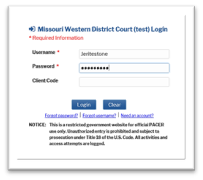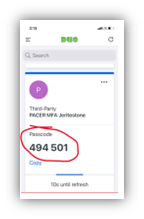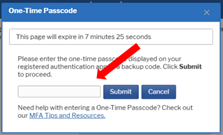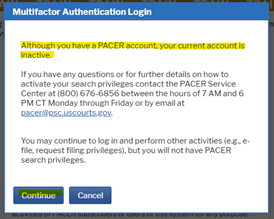Requirements for Admission
An attorney is eligible for admission to the Bar of this District if he/she is a member in good standing of either the Missouri Bar or the Bar of the United States District Court for the District of Kansas.
The Western District of Missouri is a NextGen CM/ECF court. To seek any type of admission and to electronically file with the WDMO, attorneys must have an individual upgraded PACER account; shared PACER accounts cannot be used for admission or e-filing. If an attorney does not have an individual account, he/she should request one from PACER here.
New Attorneys Who Passed February/July MoBar Exam of the Current Year
As a new attorney who passed the MoBar exam in February or July of the current year, you are being given a one-time opportunity to streamline the process for becoming a member of the Western District of Missouri, provided you follow the instructions below. The application process, including payment, MUST be completed by December 31st of the same calendar year.
Please review Local Rule 83.5 which sets out the necessary eligibility and qualifications to practice in our court.
AFTER you take the WDMO Oath of Admission:
- Obtain a PACER account (if you are not already registered).
- Instructions for this procedure can be found under the PACER tab at the following court website: https://www.mow.uscourts.gov/attorney/nextgen-cmecf.
- Register for admission through www.pacer.gov.
- The Attorney Character Certificate Exemption form should be completed, scanned and uploaded in lieu of the Attorney Character Certificate when completing the online submission.
- The Attorney Character Certificate Exemption form can be found at: https://www.mow.uscourts.gov/sites/mow/files/Attorney_Character_Certificate_Exemption.pdf.
- The Attorney Character Certificate Exemption form should be completed, scanned and uploaded in lieu of the Attorney Character Certificate when completing the online submission.
- The Court will review and process your electronic application once it has been received through PACER.
- Once your application is approved, you will receive an email with the necessary link to pay the admission fee.
- You may use a debit card, credit card, or ACH account to pay this fee.
- You may use a debit card, credit card, or ACH account to pay this fee.
- Certificates of Admission will be mailed approximately 4-6 weeks after your payment has been processed.
IF you did NOT take the WDMO Oath of Admission at the Joint Oath Ceremony held at the MO State Capitol:
- Obtain a PACER account (if you are not already registered).
- Instructions for this procedure can be found under the PACER tab at the following court website: https://www.mow.uscourts.gov/attorney/nextgen-cmecf.
- Register for admission through www.pacer.gov.
- The Attorney Character Certificate Exemption form should be completed, scanned and uploaded in lieu of the Attorney Character Certificate when completing the online submission.
- The Attorney Character Certificate Exemption form can be found at: https://www.mow.uscourts.gov/sites/mow/files/Attorney_Character_Certificate_Exemption.pdf.
- Select the option for new Missouri bar member who completed the Supreme Court of Missouri's Oath Certification form AND still needs to be sworn into the WDMO.
- The Attorney Character Certificate Exemption form should be completed, scanned and uploaded in lieu of the Attorney Character Certificate when completing the online submission.
- The Court will review and process your electronic application once it has been received through PACER.
- Once your application is approved, you will receive an email with the necessary link to pay the admission fee.
- You may use a debit card, credit card, or ACH account to pay this fee.
- You may use a debit card, credit card, or ACH account to pay this fee.
- Once payment has been received, the Court will notify you to coordinate attendance at an Attorney Swearing-In Ceremony.
- Certificates of Admission will be mailed approximately 6-8 weeks following completion of the admission requirements.
As a member of our bar, it is imperative that you keep the court informed of your current contact information, especially your email address. The court uses your email address to send out important notices to all bar members and to alert you, each January, of the requirement to pay an online annual bar membership fee. Please remember that failure to receive the attorney annual dues email does not excuse you from your obligation to pay the annual dues fee by January 31 in order to remain active in our bar. The current annual fee can be found on our fee schedule.
If you have any questions, please contact Attorney Admissions at (573) 636-4015 or jcgen@mow.uscourts.gov.
REMINDER: You are NOT a member of the Western District Bar until your application has been completely processed as outlined above, inclusive of paying the online fee. Your presence at the official ceremony is only one step of the process.
Missouri Bar Member, in good standing
- Once the applicant has a PACER Account, that account should be used to request admission. Step-by-step instructions are located under the "Attorney Bar Registration" option here.
- The Attorney Character Certificates should be completed by two 5-year Active members of WDMO bar, scanned into one file, and attached to the attorney's electronic admission request at this PACER screen:
Document Upload:Click the Upload button, then +Browse to attach the Certificates from Two Active, 5-Year Members of this Court’s Bar. **Note that the two certificates should be saved and uploaded as one PDF document.**
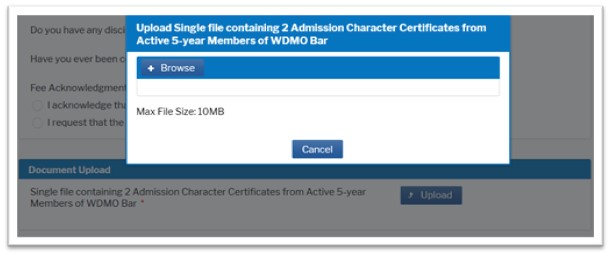
- When your admission request has been approved, the applicant will receive an email providing instructions on how to pay the application fee.
- An Oath of Admission is required after payment of the fee. The court will notify the applicant to coordinate attendance at an Attorney Swearing-In Ceremony.
- Applicant will receive a Certificate of Admission within 6-8 weeks of completion of the admission requirements.
Reciprocity - United States District Court, District of Kansas, in good standing
- Once the applicant has a PACER Account, that account should be used to request reciprocity admission. Step-by-step instructions are located under the "Attorney Bar Registration" option here.
- Attorney Character Certificates are not required for Reciprocity attorneys; the Attorney Character Certificate Exemption form should be completed, scanned, and attached to the electronic admission request at this screen:
Document Upload:Click the Upload button, then +Browse to attach the Certificates from Two Active, 5-Year Members of this Court’s Bar. **Note that the two certificates should be saved and uploaded as one PDF document.**

- When your admission request has been approved, the applicant will receive an email providing instructions on how to pay the application fee.
- Applicant will receive a Certificate of Admission within 6-8 weeks of completion of the admission requirements.
U.S. Government Attorneys
- Once the applicant has a PACER Account, that account should be used to request government admission. Step-by-step instructions are located under the "Attorney Bar Registration" option here.
- An admission fee is not required.
- Attendance at an Attorney Swearing-in Ceremony is not required.
Pro Hac Vice
- Complete Petition for Admission Pro Hac Vice.
- Application fee is paid online through CM/ECF with the electronic filing of the "Motion to Appear Pro Hac Vice" by the sponsoring attorney.
- E-filing privileges for the WDMO must be requested through PACER. This can be done here. This request will not be granted until the pro hac vice motion has been approved by the court.
Attorney Annual Dues
UNITED STATES DISTRICT COURT
Western District of Missouri
LOCAL RULE 83.5
ATTORNEY ANNUAL DUES
Members of the WDMO District and Bankruptcy Courts must pay an annual fee to maintain an "active" status. The attorney annual dues collection period runs from January 1st – January 31st each year. A courtesy email notice will be sent to "active" members each January. Please refer to the current fee schedule for the dues amount.
STEP BY STEP INSTRUCTIONS
| PREPARE | |
| You will need: |
|
| VERIFY INFORMATION | |
| 1. Access WDMO CM/ECF. Enter Username and Password. Click Login. |
https://ecf.mowd.uscourts.gov/cgi-bin/login.pl |
|
2. Open MFA app on your phone and locate the code associated with your PACER account. |
|
| 3. Enter the MFA app passcode in the One-Time Passcode box on your computer screen. Click Submit. |
NOTE: If you receive a message that says:
Click Continue. |
| 4. Check Redaction Agreement box > click Continue. | 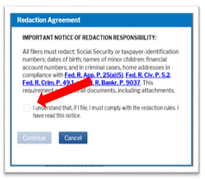 |
| 5. Select Utilities. | 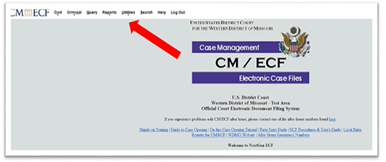 |
| 6. Select Maintain Your Account. | 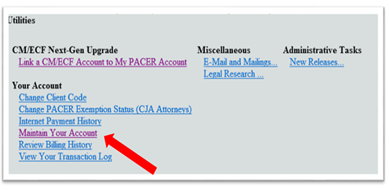 |
| 7. Verify contact information.
If there are no changes, proceed to Step 1 of Submit Payment for Annual Fee. If you need to make changes to your person information (name change), address, phone number, email address, etc., proceed to Step 8. |
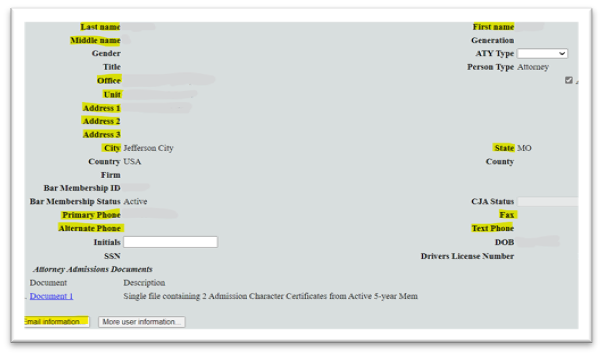 |
| 8. Select Edit Name and Address Information. | 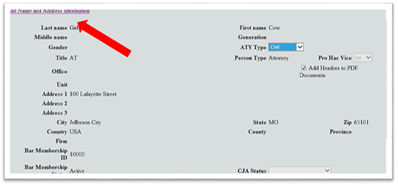 |
| 8a. A new window will open with PACER.
You may have to re-enter your PACER password, then Select Maintenance. |
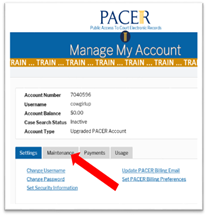 |
8b. Choose an option to update:
NOTE: Changes to secondary email addresses must be done through CM/ECF under Maintain My Account. |
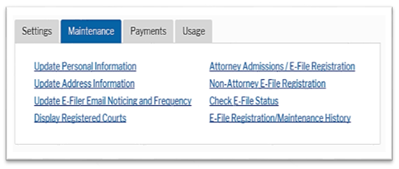 |
| 8c. Make the necessary changes under each option and click Submit. | |
| 9. Return to your original window or tab to access the WDMO CM/ECF website and continue to Step 1 below to Submit Payment for Annual Fee. | 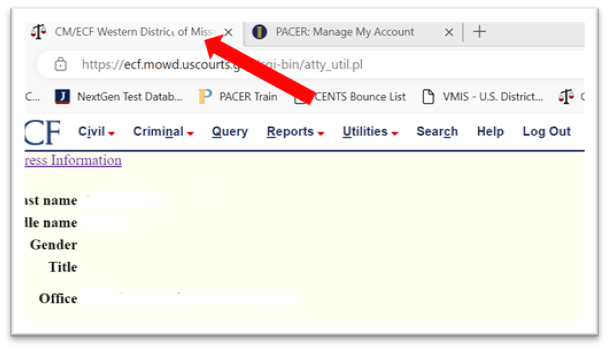 |
| SUBMIT PAYMENT FOR ANNUAL FEE | |
| 1. Select Civil.
|
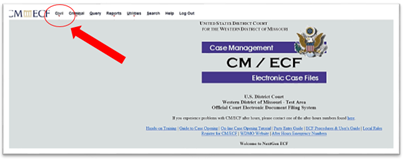 |
| 2. Select Attorney Annual Dues.
NOTE: If you only see Attorney Reinstatement, you are currently inactive and need to pay a reinstatement fee. |
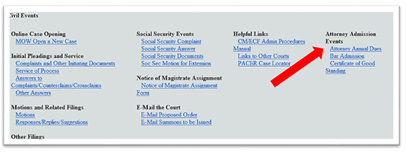 |
| 3. Click on Pay Attorney Annual Dues in the Available Events box.
This will automatically fill in the Selected Event box > click Next > click Next. |
 |
| 4. If you previously verified your court information, click Next. | |
| 5. Enter Bar Number > click Next. |  |
| 6. Read statement in Red Text and Black Text > click Next.
NOTE: You will be redirected back to PACER for payment information. |
|
| 7. Choose payment option > click Next. | 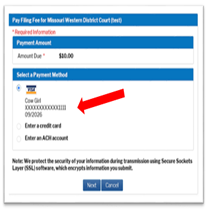 |
| 8. Complete Court Specific box > Attorney Name > Firm Name (if desired) > Person Completing the Transaction. |  |
| 9. Complete the Email Receipt box. | 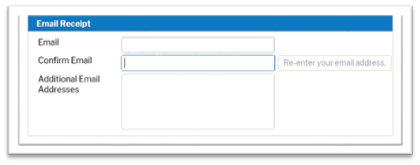 |
| 10. Check the Authorization box > click Submit.
NOTE: You will be redirected back to CM/ECF website to complete event. |
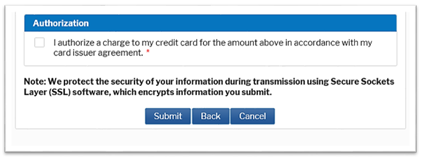 |
| 11. Click Next > Click Next. | |
| 12. Process is complete when presented with Notice of Electronic Filing.
NOTE: This is your receipt for payment. You will also receive an email confirmation. |
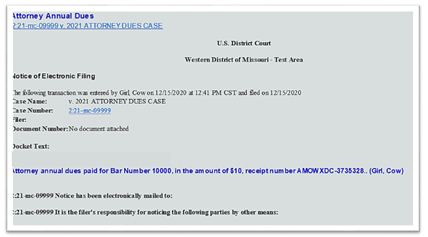 |
If you need further assistance, please email jcgen@mow.uscourts.gov or call (573) 636-4015.
Bar Admission Maintenance and Information Updates
It is the bar member's responsibility to notify the court immediately with any changes in contact information. Such changes include name, firm, address, phone number, fax number, and email address. These changes should be made on the attorney's PACER account; PACER will share that information with the WDMO. Such changes made directly with the WDMO do not carry over to the attorney's PACER account.
Inactive Status
Members may request inactive status. This allows an attorney to retain membership, but an inactive attorney may not practice in the WDMO. While on inactive status, members do not pay an annual fee. Members will be placed on inactive status by the Court if they fail to pay the annual fee. Submit a request to be placed on inactive status by emailing jcgen@mow.uscourts.gov.
Reinstatement - Non-Disciplinary Related
Members may request to be reinstated as an "active" member of the bar by paying a reinstatement fee electronically, via District CM/ECF. Payment should be submitted using the attorney's PACER login and password and selecting Western District of Missouri District Court. Upon logging into District CM/ECF through PACER, select the link for attorney reinstatement under the Civil tab. A credit card or ACH account is required for the fee payment unless one has previously been stored with PACER for payment of "Court" fees. For any questions, please contact jcgen@mow.uscourts.gov.
Certificate of Good Standing
Certificates of Good Standing are available through the District CM/ECF site. The request and payment should be submitted using the attorney's PACER login and password and selecting Western District of Missouri District Court. Upon logging into District CM/ECF through PACER, select the link for Certificate of Good Standing under the Civil tab. A credit card or ACH account is required for the fee payment unless one has previously been stored with PACER for payment of "Court" fees. See procedures for more specific instructions on obtaining a Certificate of Good Standing.
Disciplinary Action
Attorney Discipline
83.6 ATTORNEY DISCIPLINE
(a) Generally. If an attorney admitted to this Bar commits misconduct as specified in this Rule, then the Court en banc may discipline that attorney in accordance with this Rule.
(b) Definitions. As used in this Rule:
-
Any Court. “Any court” includes any federal court or the court of any state, territory, commonwealth, or possession of the United States.
-
Serious Crime. “Serious crime” includes any crime, a necessary element of which, as determined by the statutory or common law definition of such crime in the jurisdiction where the judgment was entered, involves false swearing, misrepresentation, fraud, willful failure to file income tax returns, deceit, bribery, extortion, misappropriation, theft, or an attempt or a conspiracy or solicitation of another to commit the above crimes.
(c) Forms of Misconduct.
-
Attorneys Violating Rules of Professional Responsibility. An attorney admitted to this Bar has committed misconduct if he or she violates the District’s adopted Code of Professional Responsibility, whether by act or omission, whether committed individually or in concert with any other person or persons, and whether committed in the course of an attorney client relationship or the practice of law. The District’s Code of Professional Responsibility is the Rules of Professional Conduct adopted by the Supreme Court of Missouri, except as otherwise provided by specific order of the Court en banc after consideration of comments by representatives of bar associations within the State.
-
Attorneys Convicted of Crimes.
-
Any attorney admitted to practice before this Court shall, upon being disbarred on consent or resigning from the bar of any other Court of the United States or the District of Columbia, or from the bar of any state, territory, commonwealth or possession of the United States while an investigation into allegations of misconduct is pending, promptly inform the Clerk of this Court of such disbarment on consent or resignation.
-
If the Clerk receives a certified copy of a judgment of conviction demonstrating that an attorney admitted to this Bar has been convicted of a serious crime in any court, the Court en banc must enter an order commencing a disciplinary proceeding and immediately suspending that attorney until final disposition of the disciplinary proceeding. The Court en banc must immediately serve a copy of such order upon the attorney. Upon a showing of good cause, the Court en banc may set aside such order.
-
An attorney suspended under this Rule must be reinstated immediately upon the filing of a certificate demonstrating that the underlying conviction of a serious crime has been reversed. This reinstatement does
not terminate any disciplinary proceeding then pending against the attorney, the disposition of which must be determined by the Court en banc on the basis of all available evidence pertaining to both guilt and the extent of discipline to be imposed. -
In any disciplinary proceeding instituted against an attorney based upon a criminal conviction, a certified copy of a judgment of that is conclusive evidence that the attorney committed that crime.
-
If the misconduct alleged is the commission of a serious crime, the Court en banc may not issue discipline until all appeals from the conviction are concluded.
-
- Attorneys Disciplined by Other Courts
-
An attorney admitted to this Bar has committed misconduct if subjected to public discipline by any court besides this District. Upon being subjected to such discipline, the attorney must so inform the Clerk.
-
Upon the filing of a certified or exemplified copy of a judgment or order demonstrating that an attorney admitted this Bar has been disciplined by another court, this Court en banc must serve on the attorney under investigation:
-
A copy of the judgment or order from the other court; and
-
An order directing the respondent to show cause within 30 days why the Court en banc should not impose identical discipline.
-
-
If the other court has stayed the discipline imposed, any reciprocal discipline imposed by the Court en banc must be deferred until the stay expires.
-
In any disciplinary proceeding instituted against an attorney based upon discipline by another court, a final adjudication by that court that the attorney was guilty of misconduct is conclusive evidence that the attorney committed misconduct.
-
No sooner than 30 days after serving the respondent, the Court en banc must impose the identical discipline unless the Court en banc enters an order finding from the face of the certified copy of the judgment or order that clearly:
-
The procedure was so lacking in notice or opportunity to be heard as to constitute a deprivation of due process;
-
There was such an infirmity of proof establishing the misconduct as to give rise to the clear conviction that this Court en banc could not, consistent with its duty, accept as final the conclusion on that subject;
-
The imposition of the same discipline by the Court en banc would result in grave injustice; or
-
The misconduct established warrants substantially different discipline.
-
-
Upon resigning or being disbarred on consent from the bar of any other court, the attorney must so inform the Clerk. Upon the filing of a certified or exemplified copy of a judgment or order by any other court accepting the resignation or disbarment on consent from that court by an attorney admitted to this Bar, the Clerk must strike the attorney’s name from the rolls. The stricken attorney is no longer permitted to appear or practice in this District. Such a resignation or disbarment on consent does not terminate any disciplinary proceeding against that attorney in this District.
-
(d) Disciplinary Proceedings. Except as specified in Rule 83.6(c), the following governs the process of disciplining attorneys admitted to this Bar that have committed misconduct.
-
Initiating a Disciplinary Investigation. When misconduct, or allegations which, if substantiated, would constitute a misconduct, on the part of an attorney admitted to this Bar come to the attention of the Clerk or a judge, whether by complaint or otherwise, and the applicable procedure is not otherwise mandated by this Rule, the Clerk must initiate a disciplinary investigation.
-
Investigation.
-
Once a disciplinary investigation is initiated, the Court en banc may refer the matter to an attorney to serve as a special master.
-
The special master may perform any appropriate task, including investigating the case, determining whether probable cause exists to believe that an attorney has violated Rule 83.6(c), prosecuting a formal disciplinary proceeding, and formulating another appropriate recommendation.
-
An attorney is eligible to serve as special master if he or she is an attorney for the Missouri Office of Chief Disciplinary Counsel, a member of this Bar, or an Assistant United States Attorney. The attorney under investigation may move at any time to disqualify a special master on the grounds that the special master is or has been engaged in any matter as an adversary of the attorney under investigation. A special master, once appointed, may not resign unless granted leave of the Court en banc.
-
If the special master concludes after investigation and review that there is probable cause to believe that an attorney has violated Rule 83.6(c), the special master must demonstrate such to the Court en banc. If the Court en banc concurs with the special master, the special master must file with the Court en banc an order that contains a short and plain statement of each ground for discipline and that directs the attorney under investigation to show cause why he or she should not be disciplined. The Court en banc must serve the show cause order on the respondent, who may, within 30 days, file an answer identifying any disputed issues of fact and any matters in mitigation.
-
If the special master concludes after investigation and review that there is no probable cause to believe that an attorney has violated Rule 83.6(c), or that the Court en banc should await the disposition of another proceeding against the attorney under investigation, the special master must file with the Court en banc a report containing recommendations for disposition—whether by dismissal, admonition, or deferral—and setting forth the reasons.
-
-
Once a disciplinary investigation is initiated, if the Court en banc does not appoint an attorney to serve as special master, the Court en banc must undertake its own investigation. If the Court en banc determines that there is probable cause to believe that an attorney has violated Rule 83.6(c), the Court en banc must serve on the attorney under investigation an order that contains a short and plain statement of each ground for discipline and that directs the respondent to show cause why he or she should not be disciplined. The respondent may, within 30 days, file an answer identifying any disputed issues of fact and any matters in mitigation.
-
-
Selecting Discipline.
-
If the respondent’s response to the show cause order raises any issue of fact or gives notice of issues on which the respondent wishes to be heard in mitigation, the Court en banc must set the matter for a hearing.
-
The Chief District Judge must appoint one or more judges to serve on the hearing panel. If the proceeding resulted from the initial complaint of a judge, the Chief District Judge must appoint 3 judges, none of who may be the complaining judge. If the Chief District Judge is the complainant, the active district judge with the most seniority must appoint the panel. If the appointing judge determines that the complaint involves issues related to practice before the Bankruptcy Court, at least one bankruptcy judge must be appointed.
-
The hearing panel must submit to the Court en banc a report containing findings on disputed facts and issues heard in mitigation, and recommendations for appropriate discipline, if any, to the Court en banc. Upon consideration of this report and recommendation, the Court en banc must determine the appropriate discipline, if any, and terminate the proceeding.
-
- If no hearing panel is required, then the Court en banc must determine the appropriate discipline, if any, and terminate the proceeding.
-
(e) Disbarment on Consent While Under Disciplinary Investigation or Prosecution.
-
Affidavit Required to Consent to Disbarment. Any attorney admitted to this Bar who is the subject of an investigation into, or a pending proceeding involving allegations of misconduct may consent to disbarment, but only by delivering to the Court en banc an affidavit swearing that the attorney:
-
Freely and voluntarily consents to disbarment, is not being subjected to coercion or duress, and is fully aware of the implications of so consenting;
-
Is aware that there is a presently pending investigation or proceeding involving allegations that there exist grounds for the attorney’s discipline the nature of which the attorney must specifically set forth;
-
Acknowledges that the material facts so alleged are true; and
-
Acknowledges that if charges were predicated upon the matters under investigation, or if the proceeding were prosecuted, the attorney could not successfully defend himself.
-
-
Disbarment upon Receipt of Affidavit. Upon receiving this affidavit, the Court en banc must enter an order disbarring the attorney and terminating the disciplinary investigation or proceeding.
-
Disbarment Order Matter of Public Record. The order disbarring the attorney on consent must be a matter of public record. Unless the Court en banc orders otherwise, the attorney’s affidavit may not be publicly disclosed or made available for use in any other proceeding.
(f) Resignation While Under Disciplinary Investigation or Prosecution.
An attorney admitted to this Bar who is the subject of an investigation into or a pending proceeding involving allegations of misconduct may voluntarily resign from the Bar, but the resignation does not automatically terminate the disciplinary proceeding against that attorney.
(g) Reinstatement.
-
Generally. An attorney who is suspended for more than 3 months or disbarred may not resume practice until the Court en banc grants a petition for reinstatement. An attorney who is suspended for 3 months or less is automatically reinstated at the end of the period of suspension if he or she files
with the Chief District Judge an affidavit of compliance with the provisions of the order of suspension. -
Ineligibility for Reinstatement. An attorney may not petition for reinstatement within one year following an order rejecting a petition for reinstatement. Unless the Court en banc orders otherwise, an attorney who has been disbarred may not petition for reinstatement until at least five years after the effective date of the disbarment.
-
Filing the Petition. A petition for reinstatement must be filed with the Chief District Judge and must be accompanied by an advance deposit, in an amount to be set from time to time by the Court en banc, towards payment of anticipated costs of the reinstatement proceeding. The Court en banc must fix the actual amount of the cost of the reinstatement proceeding at the conclusion of the proceeding.
-
Assigning the Petition. Upon receiving a petition for reinstatement, the Chief District Judge must assign the petition to one or more judges of this Court to conduct appropriate proceedings and to recommend appropriate disposition to the Court en banc. If the discipline resulted from the initial complaint of a judge, the Chief District Judge may not assign the petition for reinstatement to the complaining judge. The Court en banc, after consulting with the judges assigned to the petition, may appoint a special master in accordance with Rule 83.6(d)(2)(A)(ii) to investigate the petition. If a special master is appointed under this Rule, the special master must submit, within 45 days, a report and recommendation to the judges assigned to the petition.
-
Hearing on Reinstatement. After receiving and considering any report and recommendation of a special master, the judges assigned to the petition may schedule a hearing. If a hearing is scheduled, the special master must present all pertinent information bearing on the relief requested in the petition at the hearing. At the hearing, the petitioner has the burden of demonstrating by clear and convincing evidence that he or she has the necessary integrity, moral qualifications, and competency for readmission to this Bar. The judges assigned to the petition must submit suggested findings and conclusions to the Court en banc.
-
Conditions of Reinstatement. Upon consideration of these findings and conclusions, the Court en banc must decide whether to reinstate the petitioner and terminate the proceeding. The Court en banc may reinstate the petitioner subject to conditions. Conditions of reinstatement may include the payment of all or part of the costs of the proceedings, and may include partial or complete restitution to parties harmed by the attorney, and proof of competency to practice before the District.
(h) Service of Papers and Other Notices.
The show cause order specified in Rule 83.6(d) must be served on the respondent by personal service or by registered or certified mail. Service of any paper or notice under this Rule is proper if the paper or notice is addressed to the respondent at:
-
The most recent address the Clerk has on file;
-
The address indicated in the most recent pleading or other document filed in the course of any proceeding; or
-
The respondent’s last known address.
(i) Payment of Fees and Costs.
-
At the conclusion of any disciplinary investigation or proceeding, any special master may move the Court en banc for an order awarding reasonable fees and reimbursing costs expended in the course of the investigation or proceeding. The Court en banc may require the special master to submit a budget for approval.
-
The Chief District Judge may order the Clerk, as trustee of the funds collected under Rule 83.5(e), to pay the costs incurred by the Court en banc in administrating this Rule. The Chief District Judge may order these payments to be taxed as costs against any attorney disciplined by the Court en banc.
(j) Certificate of Disciplinary Judgment and Notice by Clerk.
-
Upon being informed that an attorney admitted to this Bar may have been convicted of a crime, the Clerk must determine whether the clerk of the court in which such conviction occurred has forwarded a certificate of such conviction to the Court en banc. If a certificate has not been forwarded, the Clerk must promptly obtain a certificate and file it with the Court en banc.
-
Upon being informed that an attorney admitted to this Bar may have been subjected to discipline by any other court, the Clerk must determine whether a certified or exemplified copy of the disciplinary judgment or order has been filed with the Court en banc. If it has not been filed, the Clerk must promptly obtain a certified or exemplified copy of the disciplinary judgment or order and file it with the Court en banc.
-
Upon being informed that an attorney disbarred, suspended, censured, or disbarred on consent by this District for being convicted of a crime is admitted to practice law before any other court, the Clerk must promptly transmit a certificate of the conviction or a certified exemplified copy of the judgment or order of disbarment, suspension, censure, or disbarment on consent, to the disciplinary authority of that court and to the last known office and residence addresses of the attorney.
-
The Clerk must promptly notify the National Discipline Data Bank operated by the American Bar Association of any order by the Court en banc imposing public discipline upon an attorney admitted to this Bar.
(k) Jurisdiction. This Rule does not deny the Court any powers necessary to maintain control over proceedings conducted before it, such as proceedings for contempt under Title 18 of the United States Code or under Fed. R. Crim. P. 42.
(l) Unauthorized Practice. Unless specifically authorized by a judge, an attorney who, before admission or during disbarment or suspension, exercises any of the privileges of a member of this Bar, or who pretends to be entitled to so do, is guilty of contempt of court and is subject to appropriate punishment, to be instituted in the same manner as provided in this Rule.
For any questions contact Terri Moore at (573) 556-7562 or Terri_Moore@mow.uscourts.gov.
Reference
83.5 BAR ADMISSION
(a) Roll of Attorneys. The Bar of this District consists of those attorneys admitted to appear and practice before the District. Except as otherwise provided in this Rule, only members of the Bar of this District, attorneys admitted pro hac vice, and individuals representing themselves may appear or practice before this District.
(b) Eligibility and Qualifications. An attorney is eligible for admission to the Bar of this District if he or she is a member in good standing of either the Missouri Bar or the Bar of the United States District Court for the District of Kansas.
(c) Procedure for Admission.
- Admission Materials. To apply for admission, an eligible attorney must submit to the Clerk, on the forms provided by the Clerk:
-
A written petition setting forth: the applicant’s name, age, and office address; the date the applicant was admitted to practice by the Supreme Court of Missouri or the United States District Court for the District of Kansas; an attestation that applicant is not in default in payment of any fee required by the Rules of the Supreme Court of Missouri or the United States District Court for the District of Kansas;
-
Two certificates, each signed by a member of this Bar who has at least five years’ good standing, stating when they were admitted to this Bar and what they know of the applicant’s character and experience at the Bar. If the applicant has passed the Missouri Bar Examination and been admitted to the Missouri Bar in the current calendar year, then the applicant may instead submit a form indicating, unless the Court en banc orders otherwise, that he or she does currently, or intends to:
-
Maintain a law office:
-
Associate with, or be employed by, an attorney admitted to this Bar; or
-
Serve as a law clerk to any state or federal judge.
-
-
The appropriate admission fee as set by the Court en banc; and
-
A completed registration form for the District’s Case Management/Electronic Case Files system.
-
-
Notification of Ceremony. If the submitted materials comply with Rule 83.5(c)(1), the Clerk must notify the applicant of a date and time for the admission ceremony.
-
Procedure at Ceremony. The applicant must attend the admission ceremony. When his or her petition is called in open court, a member of this Bar must move the admission of the applicant. If admitted, the applicant must, in open court, take an oath in the form prescribed by the Court en banc and provided by the Clerk. The Clerk must enter the attorney’s name into the rolls and the Case Management/Electronic Case Files system. The applicant is now a member of the Bar of the District.
(d) Annual Fee.
-
Annual Fee Required. Every member of this Bar must pay an annual fee as set by the Court en banc. This fee must be paid in the manner designated by the Clerk. The Clerk may establish a deadline for these payments. If a fee is received after the deadline, the Clerk may assess a reinstatement fee.
-
Failure to Comply. If an attorney fails to pay the annual fee, the Clerk must place the attorney on inactive status and disable the attorney’s Case Management/Electronic Case Files account, if applicable. While on inactive status, the attorney may not appear or practice before the District.
-
Bar Fund. The Clerk must maintain the collected annual fees in a separate account, and disburse these fees under the direction of the Court en banc.
(e) Disciplinary Registration Fees.
-
Disciplinary Registration Fees Required. Upon admission, every member of this Bar must pay the Clerk an initial disciplinary registration fee, in an amount set by the Court en banc. The Clerk must maintain these fees in a separate account, as trustee, for the payment of expenditures incurred for the payment of costs incurred in the disciplinary administration and enforcement under Rule 83.6.
-
Payment of Disciplinary Registration Fee to Another Court. If an attorney demonstrates that he or she has paid a disciplinary registration fee in another court of the United States pursuant to that court’s adoption of disciplinary rules similar to this local rule, then the attorney need not pay the registration fee required under Rule 83.5(d).
(f) Inactive Status.
-
Process. Any member of this Bar who desires to become inactive in the practice of law before the District may advise the Clerk, in writing, that the attorney desires to assume inactive status. Members also become inactive automatically upon failure to pay any annual fees.
-
Effect. Upon the filing of a notice to assume inactive status, or upon the nonpayment of annual fees, the attorney may not appear or practice before the District and is no longer required to pay the annual fees.
-
Reinstatement. If a member of this Bar has been placed on inactive status and desires to be reinstated to active status, the attorney must submit a request through the Case Management/Electronic Case Filing system and pay the required fee electronically. Once the Clerk accepts this request, the attorney is again a member of this Bar.
(g) Local Counsel. If an attorney appearing in a case maintains his or her office a great distance from the courthouse of the division assigned to the case, then the Court may require the attorney to retain a local attorney who is also a member in good standing of this Bar and who can be available for unscheduled meetings and hearings.
(h) Pro Hac Vice Admission. Any attorney who is not a member of this Bar may nonetheless appear and practice in a particular case if admitted pro hac vice.
- Eligibility. The attorney seeking pro hac vice admission must:
-
Reside outside the District;
-
Be admitted to practice in any United States District Court; and
-
Be a member in good standing in all bars of which he or she is a member.
-
-
Limited Initial Appearance before Application. An attorney that is not a member of this Bar may appear in a case, but must comply with Rule 83.5(h)(3) within 14 days after entering the appearance. If the attorney fails to do so, then the Court, upon motion or sua sponte, may remove the attorney from the case.
-
Procedures for Admission. The applicant must:
-
Associate with an active member in good standing of this Bar;
-
File a written Petition for Admission Pro Hac Vice via the Case Management/Electronic Case Files system;
-
Submit an admission fee in an amount set by the Court en banc; and
-
Submit the disciplinary registration fee under Rule 83.5(e).
-
-
Admission. If the submitted materials comply with Rule 83.5(h)(3), the Clerk must enter the applicant’s name into the rolls and notify the applicant. The applicant may then participate as an attorney in the specified case only.
-
Role of Sponsoring Attorney. As soon as the visiting attorney complies with the foregoing and enters an appearance, the Court may excuse the Rule 83.5(h)(3)(A) attorney from further attendance in the case. Even if such attorney is so excused from attendance, he or she retains all of the responsibilities of an attorney of record and must continue to accept service of papers and to serve as a point of contact or communication between the Court and the party he or she represents.
-
Discipline. Whenever an attorney applies for pro hac vice admission, the attorney thereby consents to disciplinary jurisdiction by this District for any alleged misconduct of that attorney arising in the course of or in the preparation for such proceeding.
(i) Government Attorneys and Federal Public Defenders. An attorney who is not a member of this Bar may nonetheless practice in a particular case in the attorney’s official capacity if he or she represents the United States, any of its agencies, or the Office of the Federal Public Defender, and completes a Petition for Admission of a Government Attorney. If the attorney represents the United States and does not reside within the District, the attorney must designate the United States Attorney or an Assistant United States Attorney for this District to receive service. Service of notice upon such designated attorney constitutes service upon the non-resident Government attorney.
(j) Certificates of Good Standing. A Certificate of Good Standing issued by this District attests that a particular attorney is admitted to this Bar, is not currently suspended or disbarred, has registered timely with the Clerk, and is current with payment of the annual fee. To obtain a Certificate of Good Standing, a person must make a request in writing via the Case Management/Electronic Case Filing system and submit a fee to the Clerk in an amount set by the Court en banc.
(k) Duty to Report Contact Information. An attorney admitted to practice under this Rule has a continuing duty to promptly notify the Clerk of any change of name, business address, telephone number, or e-mail address. An attorney may do so through the Case Management/Electronic Case Filing system.

